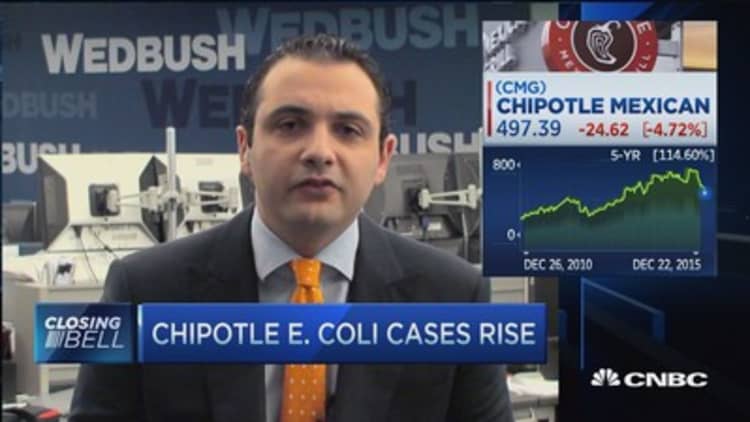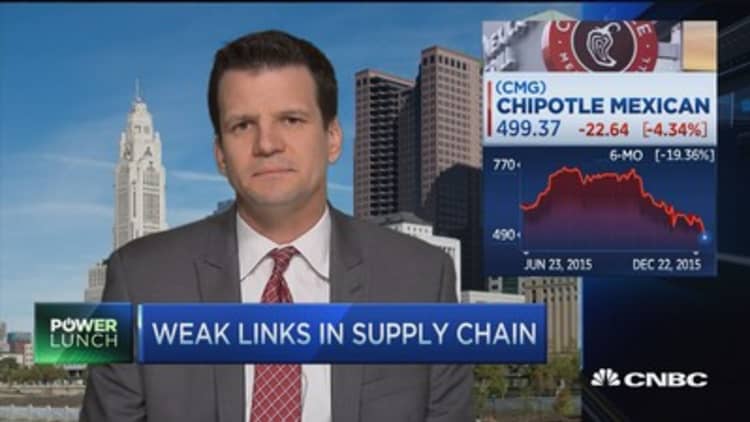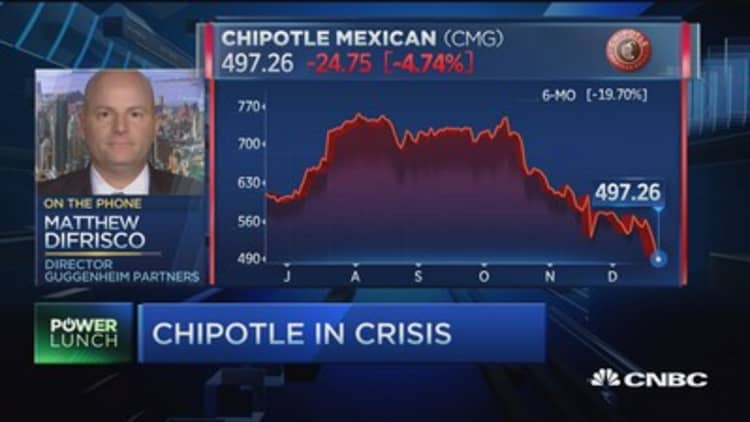


Chipotle Mexican Grill, under fire for recent outbreaks of food-borne illnesses, is defending its model of using food from local suppliers.
Chipotle's share price dipped under $500 after the Centers for Disease Control and Prevention announced earlier in the week it is investigating another, more recent outbreak of a different strain of E. coli linked to the restaurant chain.
Recent safety concerns were a departure for the fast-casual dining darling that was known for its healthy fare. Chipotle was one of the top 10 most reputable brands earlier this year, in a report by the Reputation Institute, a global consulting firm that surveyed 27,000 people on 1,000 U.S. companies.
Experts now say the chain may have to rethink its famed local sourcing, which has become a double-edged sword for the company.
"They're trying to be a big chain acting small," Larry Light, former global chief marketing officer at McDonald's, said Tuesday on CNBC's "Closing Bell." "Given its size, it's got to become more like a typical fast-food chain. ... They cannot rely on personal relationships like a small restaurant, with small local suppliers. They're going to have start using bigger-scale, national suppliers."
Chipotle spokesman Chris Arnold said locally grown produce accounts for a relatively small percentage of Chipotle's produce, about 10 percent, as many of the chain's ingredients already come from larger regional or national suppliers. Arnold said there is no evidence the outbreaks were caused by a local supplier and, in fact, the geographic reach suggests that it probably is not.
"We think there will still be room in our system for local suppliers, and will work with them to help bring them in compliance with higher standards for testing and safety," Arnold said Tuesday by email to CNBC.
John Gray, associate professor of operations at Ohio State University's Fisher College of Business, said because Chipotle usses some local suppliers, it has a complex supply chain that requires 100 percent compliance from many individuals.
"When you throw in different cultures — China, India — sourcing from those locations, small suppliers, mom and pop shops ... everyone's balancing cost, delivery and compliance, and sometimes, compliance takes a back seat," Gray said.
Unless they change the way they source, which involves a lot of disparate, small, local farmers, Chipotle will have trouble addressing the issues behind the current E. coli outbreak, Nick Setyan, restaurant analyst at Wedbush Securities, told CNBC's "Closing Bell." But changing their approach could put the brand's reputation at risk, too, Light said.
"That all goes to the heart of their competitive positioning," Setyan said. "If they change their sourcing, they're no longer the same Chipotle."
A proposal to centralize the tomato supply chain, for instance, "doesn't feel good when you want local ingredients," Gray said. But it provides a benefit of better control from fewer operations.
With revised standards already being put in place, a Chipotle spokesman told CNBC on Monday that the company is "confident" it can achieve a level of food safety risk that is near zero.
"We have indicated before that we expected that we may see additional cases stemming from this, and CDC is now reporting some additional cases," the spokesman said. "Since this issue began, we have completed a comprehensive reassessment of our food safety programs with an eye to finding best practices for each of the ingredients we use."
Wall Street, though, may still be undecided, Setyan said.
"People are looking at 2017 already and saying, 'Well, this is transient, and the market should go back up, and that's what I'm buying for,'" Setyan said. "But from my perspective, you're never going to get the types of margins that you saw in 2014 ... at least, not in the next three years."
But Gray said the recent scare could actually put Chipotle ahead in some ways.
"A lot of these things drift with lack of attention," Gray told CNBC's "Power Lunch." "Because the company's spending so much attention on quality right now, as soon as they start to figure out the root cause it will probably be safer than other outlets."
Disclosure: Chipotle is an investment banking client of Wedbush Securities.





